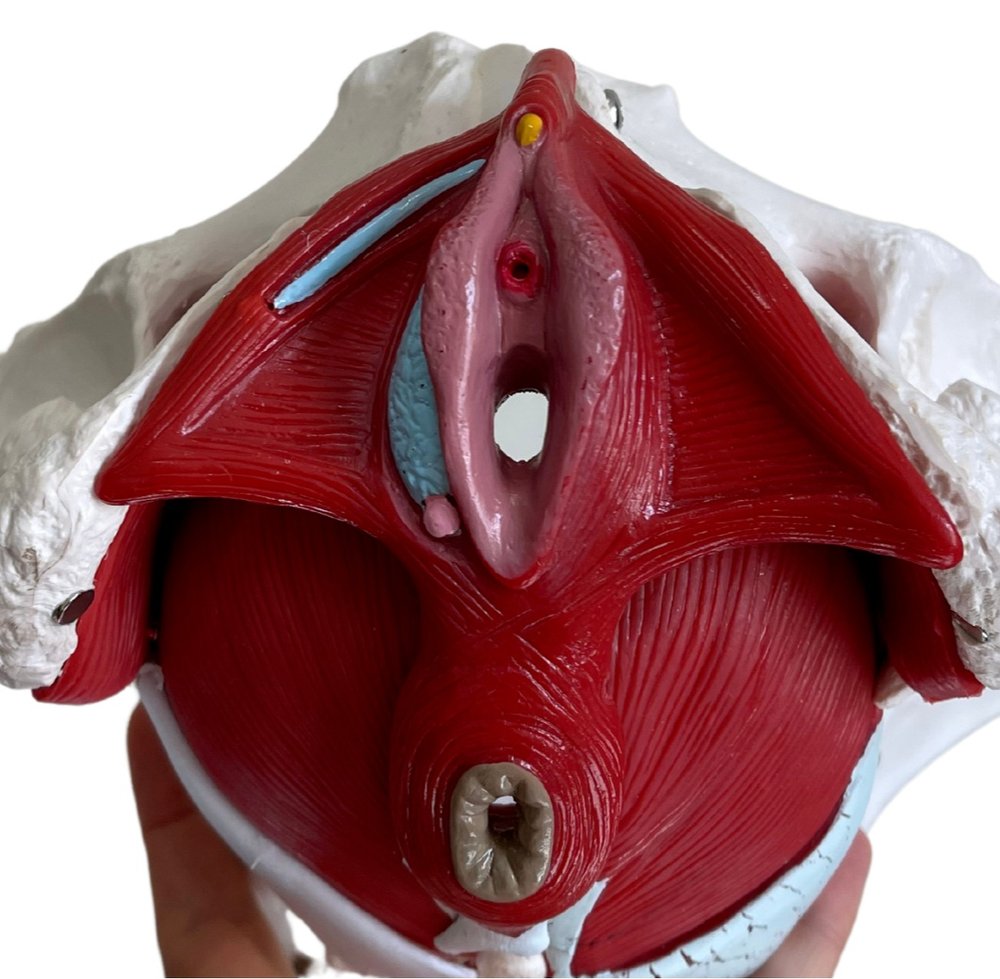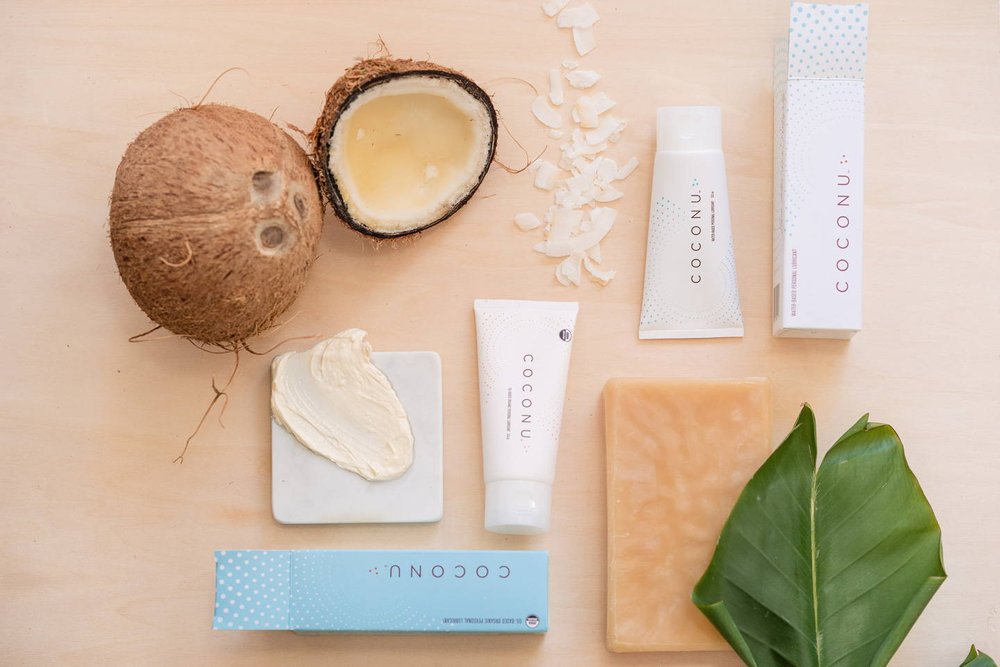The Number One Reason For Painful Sex After Childbirth
Many women experience pain or discomfort the first time they have sex after having a baby - and most have this issue in common.

Having sex again for the first time after childbirth is exciting and scary. Resuming intimacy with your partner is important for your relationship, and your mental health (orgasms release endorphins!). BUT your body has just been through an incredible transformation in order to bring your baby earthside, and the idea of penetration can cause anxiety.
While nerves and postpartum hormones can cause dryness and a bit of discomfort, they don’t cause pain. The number one reason for pain during sex after childbirth is usually a pelvic floor dysfunction. Your pelvic floor is truly an incredible bundle of muscles, supporting your entire pregnancy and birth, and it may just need some TLC to get back to operating at 100 percent.
Recent evidence shows that sexual health issues are very common after birth, with 61% of women reporting problems with pain during sex at three months postpartum, and 20% at twelve months postpartum. This simply means that you are far from alone if postpartum sex is less desirable than before pregnancy.
Although a dysfunctional pelvic floor is the most common culprit of pain, there are other reasons that sex might be less than optimal right now. If you’re wondering how to define discomfort versus pain, how to troubleshoot common problems on your own, and when to seek help - we dive into all of this and more below.
What Does Pain During Sex Really Mean?
Broadly, pain or discomfort during sex is any sensation that doesn’t feel good and wasn’t present before childbirth. When it comes to discomfort, this can mean dryness or chafing. On the other side of the scale, this can mean sharp, stabbing pain.
Where discomfort due to dryness is normally caused by postpartum hormones (and can be solved with a bit of lube), pain takes a bit more investigation, and oftentimes requires help from a pelvic floor therapist. Pain can include sensations like stabbing, burning, shooting, numbness, tingling, and itching.
These symptoms can occur during, or after sex. If you are experiencing issues, the first thing to do is investigate a bit further. Here are a few questions that will help bring clarity around what’s going on, and where the problem might be coming from.
Is it painful with insertion?
Does sex feel restrictive, stiff, and dry?
Is it superficial pain, or deeper? For example, does it only get painful when sex is prolonged, or from certain angles?
Does it hurt during sex, or after sex?
Does your pelvic floor feel heavy?
Do you experience urgency/leaking only after sex?
The reason for specifying when you feel pain is that orgasming can bring certain issues happening inside of your pelvic floor to the forefront. Regardless, if you’re experiencing any of these sensations during intercourse, know that pelvic floor dysfunction after birth is common and very treatable.
The Number One Reason For Painful Sex After Childbirth
The most common culprit of pain during sex postpartum is pelvic floor dysfunction. Your pelvic floor is a complex web of muscles that span from the bottom of the pelvis up, to support all the pelvic organs, like your bladder, bowel, and uterus.

Kelly Sammis, one of The Bloom Method’s resident Pelvic Floor Therapists and co-owner of Holistic Pelvic Health says, “A lot of women think of pelvic floor dysfunction and they're like, ‘Well, I don't pee my pants, so I don't know, it's fine.’ But there's so much more in terms of the role that the pelvic floor plays, from postural aptitude to core coordination, breath, sexual function, the bowel, and bladder, but it even goes far beyond that.”
With all that’s going on inside the pelvic floor, it’s little wonder that something can be knocked off-kilter during pregnancy and childbirth, and that can cause issues when it comes to intercourse. Sammis says that most of the time, pelvic floor dysfunction is hypertonic, meaning the muscle is so tight that it can’t go through a full range of motion, and it can’t be strong.
On the opposite end of the spectrum, pelvic organ prolapse happens when the muscles and tissues supporting the pelvic organs (the uterus, bladder, or rectum) become weak or loose. Extreme prolapse could cause inflammation, irritation, and discomfort, and certain positions during sex might create more pressure and exacerbate the problem. Prolapse is absolutely treatable, so if you suspect that’s what’s going on then we recommend talking to a pelvic floor therapist.
What about discomfort during sex?
Maybe you’re not feeling pain during sex, but it’s not as pleasurable as normal. Fear, tension and apprehension, especially those first couple of times after giving birth, can contribute to a feeling of dryness and discomfort.
A lack of estrogen during early postpartum can cause a number of uncomfortable symptoms, including vaginal dryness, hot flashes and night sweats. The tissue inside of the vagina lacks the ability to produce lubricating material and the vaginal walls aren’t as flexible, so we recommend lube and extended foreplay to make things more enjoyable.
We often find that moms are surprised if sex after a cesarean turns out to be uncomfortable. More times than not this is caused by scar tissue from the surgery. Abdominal massages and even self-massage at your incision can be a wonderful modality to assist in releasing this sticky scar tissue, leading to pain-free sex.
For Studio Bloom subscribers, we have a wonderful tutorial on scar mobility here. Or subscribe today and get access to all our postpartum recovery and workout content with a free 7-day trial.
Tips for Navigating Discomfort or Pain with Sex
Some of the prevalence of discomfort or pain with sex stems from the idea that 6 weeks postpartum is the green light. As Hayley Kava, another pelvic floor PT who works with The Bloom Method said:
“Six weeks is the green light for safety, in terms of the healing of the uterus. You’re not going to develop a uterine infection if materials get inside of your body. But a lot of people misinterpret that as the green light for intercourse, and that’s not necessarily a realistic timeline depending on the extent of your abdominal or pelvic floor injury.”
If you’re feeling hesitant, or are not completely healed from childbirth, Kava encourages you to explore different sexual activities beyond penetrative intercourse. External orgasms can be exciting, fun, and are safe for the pelvic floor and birth injuries as they continue to heal.
Here are a few more of our top tips when trying to address pain or discomfort during sex:
1. Just Breathe!
When in doubt let your breath ease you back into lovemaking. Breath helps you to relax more and connect to your pelvic floor and all the sensations of sex. Having a better connection to and understanding of your pelvic floor is going to help improve orgasms and hopefully minimize discomfort.
2. Try Perineal Massage
The perineum extends from the vaginal opening to the anus, and it’s near several nerves, muscles, and organs. It’s basically the doorway to your vagina, and it’s full of sensation. Massage and masturbation can help you to explore yourself in a comfortable way that helps you understand where your body is at right now.
3. Experiment with Different Sex Positions
A different sex position can make a big difference when it comes to navigating pain and discomfort. Certain positions increase pressure and cause pain, while others are enjoyable with minimal issue. This is all about you figuring out where your body is at and what it needs right now. It may take some experimentation, but we’d recommend starting by choosing to be on top instead of missionary style.
Bloom’s wonderful PT Hayley Kava created a sex position guide that is an incredible resource for learning more about your pelvic floor and sexual anatomy. If you do prefer to be on your back, here’s an example of a couple of options that ensure a supine sex position has the extra support required to keep your pelvis at neutral and (hopefully) avoid discomfort.

Right now you can grab the guide for 25% off using the code BLOOM.
4. Add Lubrication
As mentioned earlier, a lack of estrogen during early postpartum can cause vaginal dryness, so we recommend lube and extended foreplay to make things more enjoyable. Here at The Bloom Method, we love Coconu for its clean, natural ingredients. They offer both an oil and a water-based lubricant and are giving Bloom’s readers 20% off. Use code Bloom20 to try Coconu and take advantage of this great deal.

5. Talk with Your Partner
Whether you’re excited, anxious, fearful, or all three, it’s important to be open and honest with your partner about what you’re feeling and experiencing. While there are some aspects of improving your sexual health that may require individual work, lovemaking is a two-person game that requires you both to be committed to improving the experience.
6. Pelvic Floor Rehab
If all else fails and pain is still present, see a pelvic floor physiotherapist for some manual work that addresses both the relaxation and engagement of the pelvic floor.
The Bottom Line About Pain During Sex
Remember to give yourself grace as you navigate intimacy postpartum. As pelvic floor therapist Kelly Sammis puts it: painful intercourse is common, but it’s never normal.
When experiencing pain or discomfort, start by problem-solving with things you can try on your own, like added lube, experimenting with sex positions, tapping into your breath and pelvic floor, and adding more foreplay to your lovemaking.
If pain or discomfort persists over weeks, it’s probably time to book an appointment with a pelvic floor physiotherapist who can help you get to the heart of the problem and give you more tools and exercises to help expedite healing.



